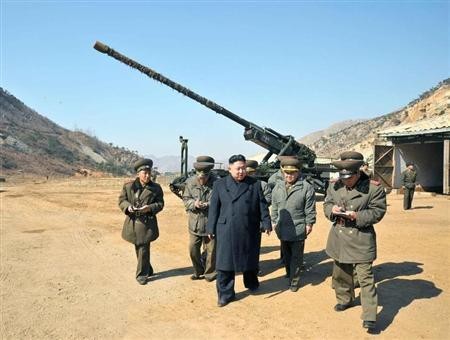
North Korea has not stopped its angry rhetoric, including nuclear strike threats against South Korea and the United States, ever since the United Nations (UN) passed new sanctions against the impoverished country for conducting nuclear test in February.
It was not only the UN sanctions that have angered Pyongyang. The military activities of the US in the Korean peninsula also seem to have rung alarm bells .
South Korea hosted a joint military drill with the US on 1 March despite Seoul's concern on such activities in the peninsula. The joint exercise involved 2,500 US troops.
Pyongyang revealed its sense of insecurity by the presence of US army in South by threatening to cut off Red Cross hotline with Seoul if the joint military drill was not cancelled. The countries did not pay heed, leading to Pyongyang's declaration that it had scrapped the 60-year-old Armistice Agreement 1953 that ended the Korean War.
"What is graver is the fact that the US cooked up the resolution on sanction timing to coincide with the "Key Resolve" and "Foal Eagle" joint military exercises," North Korea's official news agency KCNA news agency had said in a statement while announcing the scrapping of the Korean Armistice Agreement.
North Korea went on to cut a military hotline, the last channel of communications with South Korea, saying that war could break out any time.
"Under the situation where a war may break out at any moment, there is no need to keep north-south military communications which were laid between the militaries of both sides," KCNA news agency quoted a military spokesman as saying. "There do not exist any dialogue channel and communications means between the DPRK and the US and between the north and the south."
Besides the joint military drills with South Korea, the US provoked Pyongyang even further on Thursday by bringing two of its famous radar-evading B-2 Spirit bombers to South Korea.
North Korea responded to US' power show by sending out a statement that its supreme leader Kim Jong Un signalled an attack on South.
"He finally signed the plan on technical preparations of strategic rockets of the KPA (Korean People's Army), ordering them to be on standby for fire so that they may strike any time the U.S. mainland, its military bases in the operational theatres in the Pacific, including Hawaii and Guam, and those in South Korea," KCNA said.
Russia, which has good relations with North Korea, has also expressed concerns over the deployment of stealth fighter jets.
"We are concerned that alongside the adequate, collective reaction of the U.N. Security Council, unilateral action is being taken around North Korea that is increasing military activity," Foreign Minister Sergei Lavrov told reporters in Moscow. "The situation could simply get out of control, it is slipping toward the spiral of a vicious cycle."












